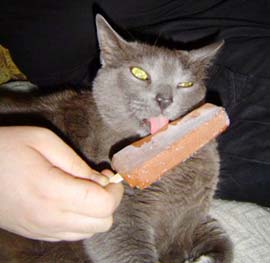What cats do not know is sweet
Sugar or spices does not mean anything to a cat. This ingenious four-legged friend only cares about one thing: animal meat. Not because in each of these tamed cats hides a murderer who only attempts to catch birds or mice, but also because cats are incapable of tasting sweet, unlike all other mammals tested so far.
The tongues of most other mammals have sensory receptors, which activate and alert the body when exposed to something, and report it to the brain. Humans have 5 different types of taste buds (probably 6): sour, bitter, salty, meaty and sweet (can add fat). The sweet feeling is actually created by two independent genes: Tas1r2 and Tas1r3.

Cats lack genes that allow them to feel sweet.(Photo: Photobucket)
When working properly, these two genes help the body recognize the sweetness of carbohydrate-rich foods - a major source of food for plants and omnivores like humans.
However, cats belong to Carnivora's high-class lineage, and unlike some of their lower-ranking members, such as omnivorous bears or grass-eating pandas, they only eat meat. Whether this is the cause or the result, it also caused all cat family members - including lions, tigers and cats - to lack 247 pairs of amino acids that make up the gene of Taslr2. As a result, because it is impossible to decipher the proper protein, cats cannot know the sweetness.
So far, cats are the only animal group that lacks a gene that senses sweetness, although their close relatives in the carnivorous group such as hyenas and mongoose still have this ability. Even so, most cat food today still uses grains or other nuts, "that's why cats are becoming obese," said Joe Brand, a biochemist at the Center for Perception. Monell chemistry in Philadelphia said.
T. An
- The 'strange' cats in the world
- Did you know how to caress cats properly?
- In the end human beings were able to understand the Cats
- Why should sweet potatoes be eaten?
- Cats - mass assassins in the animal world
- The best time to eat sweet potatoes
- 10 interesting things about cats
- Cats were in solitary confinement for leading their fellow escapes
- Strange ability of cats
- The great cavalry when eating sweet potatoes, know that avoid if you do not want to 'carry serious disease'
- New breed of hybrid cat wolf
- Did cats come with the Vikings to conquer the world?
 Animal 'suffering' after hibernation
Animal 'suffering' after hibernation Why do goats climb well?
Why do goats climb well? Scientists were surprised to see chimpanzees eating turtles
Scientists were surprised to see chimpanzees eating turtles Giant catfish died deadly due to drought in Thailand
Giant catfish died deadly due to drought in Thailand